
ai-hub
Enterprise Azure OpenAI Hub provides prescriptive architecture and guidance to accelerate Generative AI on Azure for all organisations, in a secure, compliant, scalable, and resillient way, and to democratize proven use-cases to quickly realise business value
Stars: 76
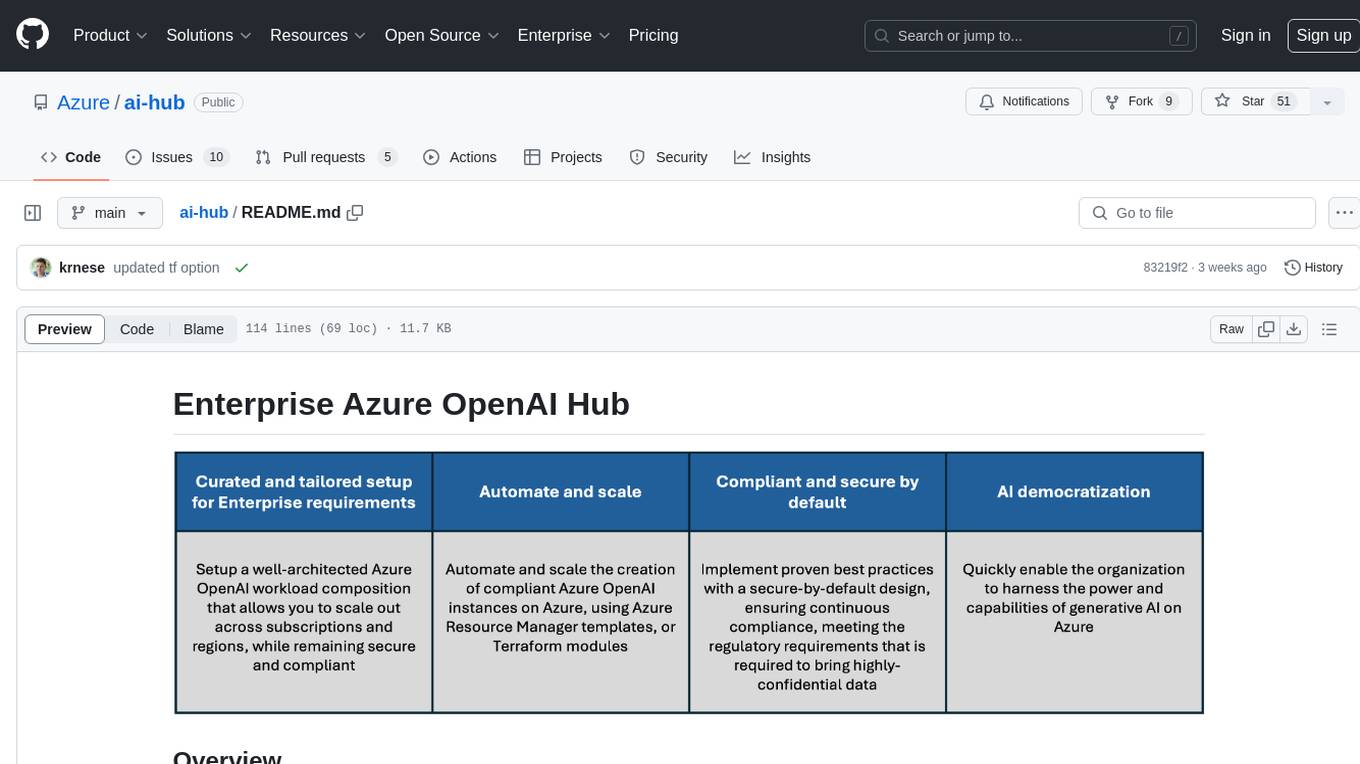
The Enterprise Azure OpenAI Hub is a comprehensive repository designed to guide users through the world of Generative AI on the Azure platform. It offers a structured learning experience to accelerate the transition from concept to production in an Enterprise context. The hub empowers users to explore various use cases with Azure services, ensuring security and compliance. It provides real-world examples and playbooks for practical insights into solving complex problems and developing cutting-edge AI solutions. The repository also serves as a library of proven patterns, aligning with industry standards and promoting best practices for secure and compliant AI development.
README:
Welcome to the Enterprise Azure OpenAI Hub!
This repository is your ultimate guide to the exciting world of Generative AI on the Azure platform. Whether you are a seasoned AI enthusiast or just starting your journey, this hub is designed to provide an easy, fun, rapid, and immersive learning experience, and ideally accelerate the path from whiteboard to proof of concept, and from proof of concept to production in an Enterprise context.
Our primary goal is to empower you to explore a multitude of use cases with relevant Azure services, fully configured to meet your security and compliance requirements for the Enterprises. We've carefully structured this repository to provide an intuitive understanding of how best to leverage the power of Azure services for your AI needs. Through a series of real-world examples, and playbooks you'll gain practical insights into using Azure to solve complex problems and develop cutting-edge AI solutions.
But we don't stop at just exploring. The Enterprise Azure OpenAI Hub also serves as a comprehensive library of use cases based on proven patterns. We understand the importance of best practices in driving successful AI initiatives. Therefore, every use case in our library aligns with the highest industry standards and promotes best practices. You'll learn not just the 'how', but also the 'why' behind each pattern, giving you a solid grounding in the principles of secure and compliant AI development.
Dive in and start exploring! The Enterprise Azure OpenAI Hub is your gateway to the world of AI on Azure. Whether you're a developer, a data scientist, or a business leader, you'll find everything you need to get started and build your AI skills. Let's create the future together!
- Enterprise Azure OpenAI Hub reference implementation
- Things that matters
- Use cases
- Contributing
- Roadmap
The Enterprise Azure OpenAI Hub is not just a learning resource; it's a comprehensive foundation for all your AI applications and use cases. It provides a robust infrastructure that allows you to build, test, and deploy AI models with ease. With our extensive library of use cases, you can dive right into practical applications of AI, learning by doing and gaining invaluable hands-on experience.
One of the key strengths of Enterprise Azure OpenAI Hub is its uncompromising focus on security, scalability, and reliability (if you decide to lead with our recommendations). We understand that these are non-negotiable requirements for any AI initiative. Therefore, we've embedded these principles right into the core of the Enterprise Azure OpenAI Hub. Our platform is designed to ensure that your AI applications are not only powerful and flexible, but also secure and reliable.
Scalability is another critical aspect of AI development. As your skills grow and your needs evolve, the Enterprise Azure OpenAI Hub is ready to scale with you, supporting everything from simple proof-of-concept models to complex, enterprise-wide AI solutions.
So why wait? Start your journey with Generative AI on Azure today. Dive into the Enterprise Azure OpenAI Hub reference implementation, and discover the incredible potential of AI. Let's create the future together!
You can deploy the following reference implementations to your Azure subscription.
| Reference Implementation | Description | Deploy | Instructions |
|---|---|---|---|
| Enterprise Azure OpenAI Hub | Provides an onramp path for Gen AI use cases while ensuring a secure-by-default Azure OpenAI workload composition into your Azure regions and subscriptions | User Guide | |
| Enterprise Azure OpenAI Hub Terraform | Provides an onramp path for Gen AI use cases while ensuring a secure-by-default Azure OpenAI workload composition into your Azure regions and subscriptions | User Guide |
In the below sections, we will discuss the architecture and design, and security and compliance considerations of the Enterprise Azure OpenAI Hub, and go into the details of - well, the things that actually do matter for Enterprise organizations and their AI initiatives on Azure. These articles are designed to provide a comprehensive understanding of the principles and best practices, so architects and engineers, as well as cybersecurity and compliance professionals, can make informed decisions and take the right steps to ensure the success of their AI initiatives.
The architecture and design is proven, prescriptive, with security and governance being front and center - but not at the expense of autonomy and developer freedom for innovation and exploration. It does not leave any room for interpretation, as its been validated with our largest and most complex customers in highly regulated industries. Yet, it provides a flexible starting point for the less complex, and smaller customers, and can scale alongside the organization, business requirements, use cases, and the Azure platform itself due to the design principles and patterns that are employed alongside with the alignment with the overall Azure platform roadmap.
Customers in regulated industries must define and enforce required controls in order to meet compliance and security requirements while empowering application teams with sufficient freedom to innovate and deploy Azure AI services in a safe and secure manner. To ensure the right balance for the central platform and the application teams, Enterprise Azure OpenAI Hub provides a secure and compliant foundation for AI workloads, while also providing a secure-by-default Azure OpenAI workload composition into the designated Azure subscriptions.
 Responsible AI and prompt engineering
Responsible AI and prompt engineering
With great power comes great responsibility. As AI becomes more ubiquitous and influential, it is imperative to ensure that it is used in a responsible manner that adheres to ethical principles, respects human values, and minimizes potential harms. In this article, we will explore some of the challenges and opportunities of using large language models (LLMs), such as those developed by Azure OpenAI, to create AI applications. We will also introduce some of the tools and best practices that can help developers to use LLMs responsibly and effectively, such as mitigation strategies, prompt engineering, and monitoring. By the end of this post, you will have a better understanding of how to leverage the power of LLMs while ensuring the safety and quality of your AI applications.
The Enterprise Azure OpenAI Hub provides prescriptive architecture and design guidelines for several use cases that have served as proven patterns in several customer engagments. We aim to incorporate the learnings and best practices while making it as simple as possible for you to validate in your own context, using your own data as needed. Whether you are using the use cases for learning, exploration, or production deployments - we are equally happy as long as it can help you in your desired direction while unlocking Gen AI scenarios on the Azure platform. We will continue to iterate and add more use cases to the library as we continue to evolve and refine commun customer patterns and adoption, aligned with the development of the Azure AI platform itself.
For technical validation of the use cases you consider to deploy, you can go through the step-by-step guidance in the use cases documentation.
For a deeper understanding of the architecture for each use case, and the reasoning behind the design decisions, you can read more about the available use cases in the sections below.
GPT4 Vision together with Azure AI Vision services can be used to recognize and understand the content of images and videos. This use case is designed to provide a comprehensive understanding of how to leverage the power of Azure AI Vision services to solve complex problems and develop cutting-edge AI solutions.
Learn more about the architecture and how to use the use case in the Image and Video recognition architecture article.
Azure native RAG Architecture leveraging Azure AI search for vectorization and using Azure OpenAI for generating embeddings and decoding the embeddings to generate text. This use case is designed to provide a comprehensive understanding of how to leverage the power of Azure AI services to solve complex problems and develop cutting-edge AI solutions on your own Enterprise data.
Learn more about the architecture and how to use the use case in the 'On Your Data' architecture article
To learn more about the general "Azure OpenAI - 'On Your Data'" product documentation, visit the offial Azure OpenAI documentation.
This project welcomes contributions and suggestions. Most contributions require you to agree to a Contributor License Agreement (CLA) declaring that you have the right to, and actually do, grant us the rights to use your contribution. For details, visit https://cla.opensource.microsoft.com.
When you submit a pull request, a CLA bot will automatically determine whether you need to provide a CLA and decorate the PR appropriately (e.g., status check, comment). Simply follow the instructions provided by the bot. You will only need to do this once across all repos using our CLA.
This project has adopted the Microsoft Open Source Code of Conduct. For more information see the Code of Conduct FAQ or contact [email protected] with any additional questions or comments.
This project may contain trademarks or logos for projects, products, or services. Authorized use of Microsoft trademarks or logos is subject to and must follow Microsoft's Trademark & Brand Guidelines. Use of Microsoft trademarks or logos in modified versions of this project must not cause confusion or imply Microsoft sponsorship. Any use of third-party trademarks or logos are subject to those third-party's policies.
The AI hub project was created by the Microsoft Strategic Workload Acceleration Team (SWAT) in partnership with several Microsoft engineering teams who continue to actively sponsor the sustained evolution of the project through the creation of additional reference implementations for common artificial intelligence and machine learning scenarios.
For Tasks:
Click tags to check more tools for each tasksFor Jobs:
Alternative AI tools for ai-hub
Similar Open Source Tools

ai-hub
The Enterprise Azure OpenAI Hub is a comprehensive repository designed to guide users through the world of Generative AI on the Azure platform. It offers a structured learning experience to accelerate the transition from concept to production in an Enterprise context. The hub empowers users to explore various use cases with Azure services, ensuring security and compliance. It provides real-world examples and playbooks for practical insights into solving complex problems and developing cutting-edge AI solutions. The repository also serves as a library of proven patterns, aligning with industry standards and promoting best practices for secure and compliant AI development.
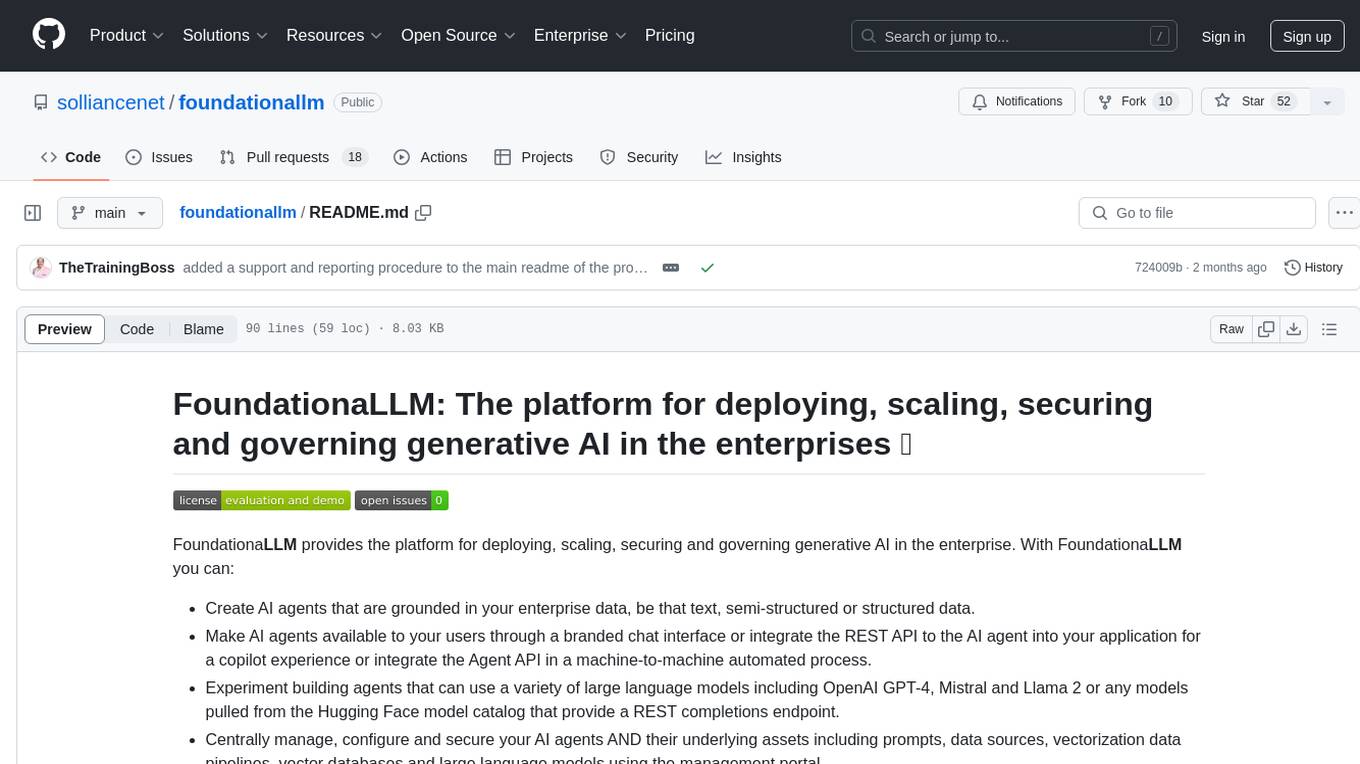
foundationallm
FoundationaLLM is a platform designed for deploying, scaling, securing, and governing generative AI in enterprises. It allows users to create AI agents grounded in enterprise data, integrate REST APIs, experiment with large language models, centrally manage AI agents and assets, deploy scalable vectorization data pipelines, enable non-developer users to create their own AI agents, control access with role-based access controls, and harness capabilities from Azure AI and Azure OpenAI. The platform simplifies integration with enterprise data sources, provides fine-grain security controls, load balances across multiple endpoints, and is extensible to new data sources and orchestrators. FoundationaLLM addresses the need for customized copilots or AI agents that are secure, licensed, flexible, and suitable for enterprise-scale production.
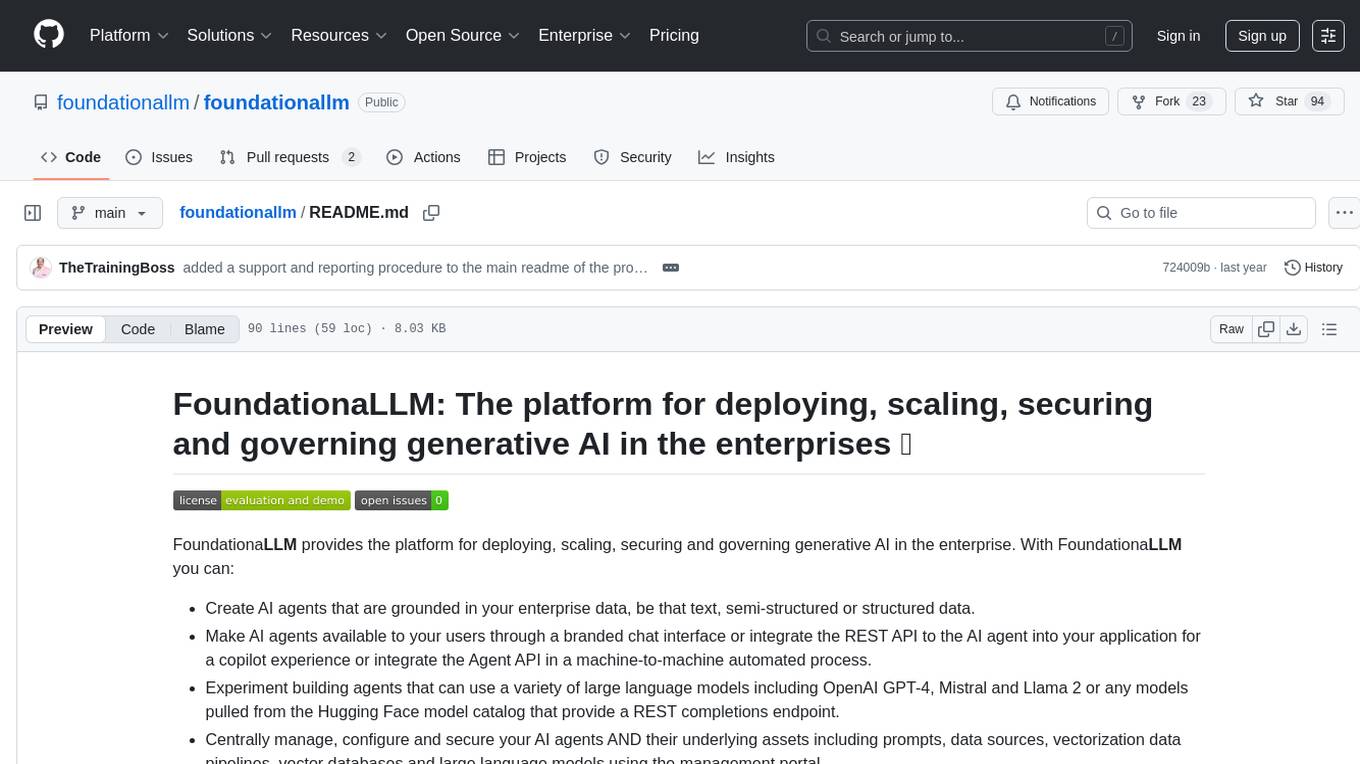
foundationallm
FoundationaLLM is a platform designed for deploying, scaling, securing, and governing generative AI in enterprises. It allows users to create AI agents grounded in enterprise data, integrate REST APIs, experiment with various large language models, centrally manage AI agents and their assets, deploy scalable vectorization data pipelines, enable non-developer users to create their own AI agents, control access with role-based access controls, and harness capabilities from Azure AI and Azure OpenAI. The platform simplifies integration with enterprise data sources, provides fine-grain security controls, scalability, extensibility, and addresses the challenges of delivering enterprise copilots or AI agents.
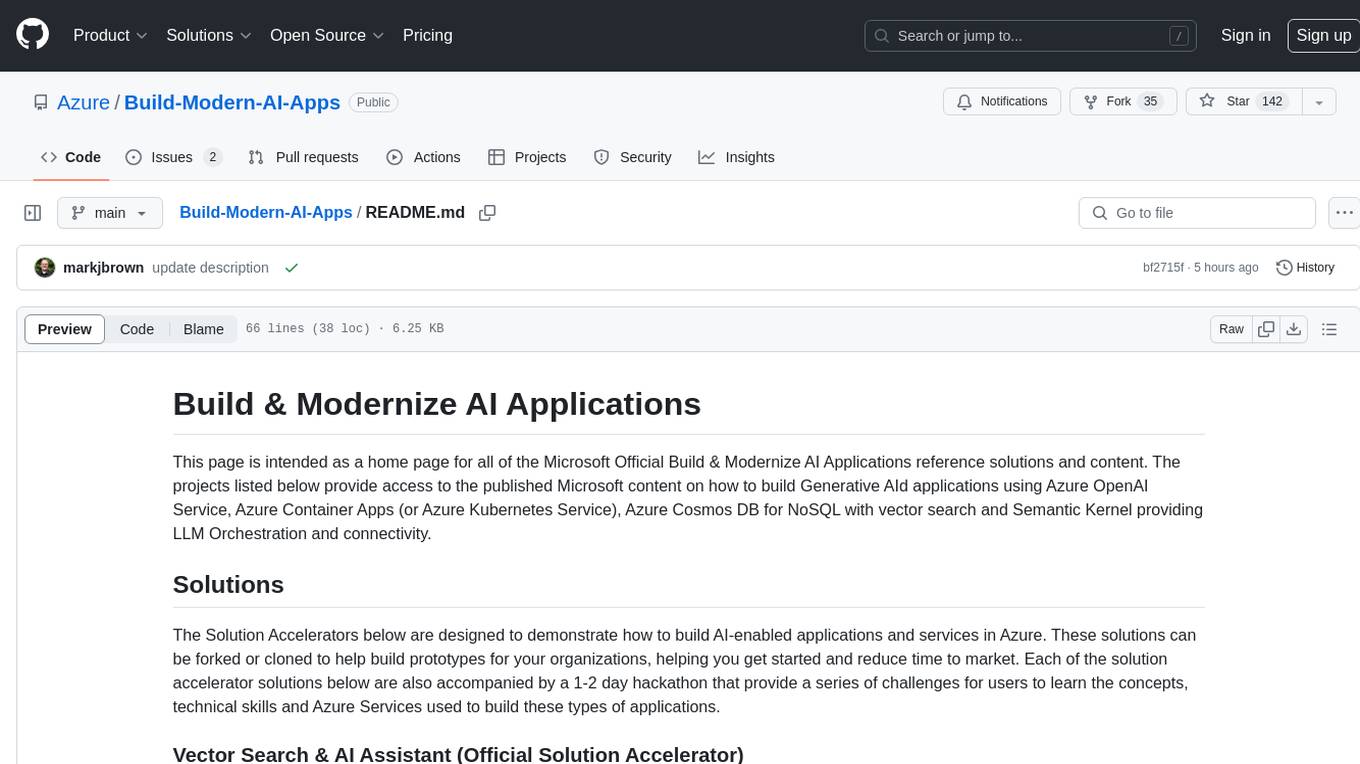
Build-Modern-AI-Apps
This repository serves as a hub for Microsoft Official Build & Modernize AI Applications reference solutions and content. It provides access to projects demonstrating how to build Generative AI applications using Azure services like Azure OpenAI, Azure Container Apps, Azure Kubernetes, and Azure Cosmos DB. The solutions include Vector Search & AI Assistant, Real-Time Payment and Transaction Processing, and Medical Claims Processing. Additionally, there are workshops like the Intelligent App Workshop for Microsoft Copilot Stack, focusing on infusing intelligence into traditional software systems using foundation models and design thinking.
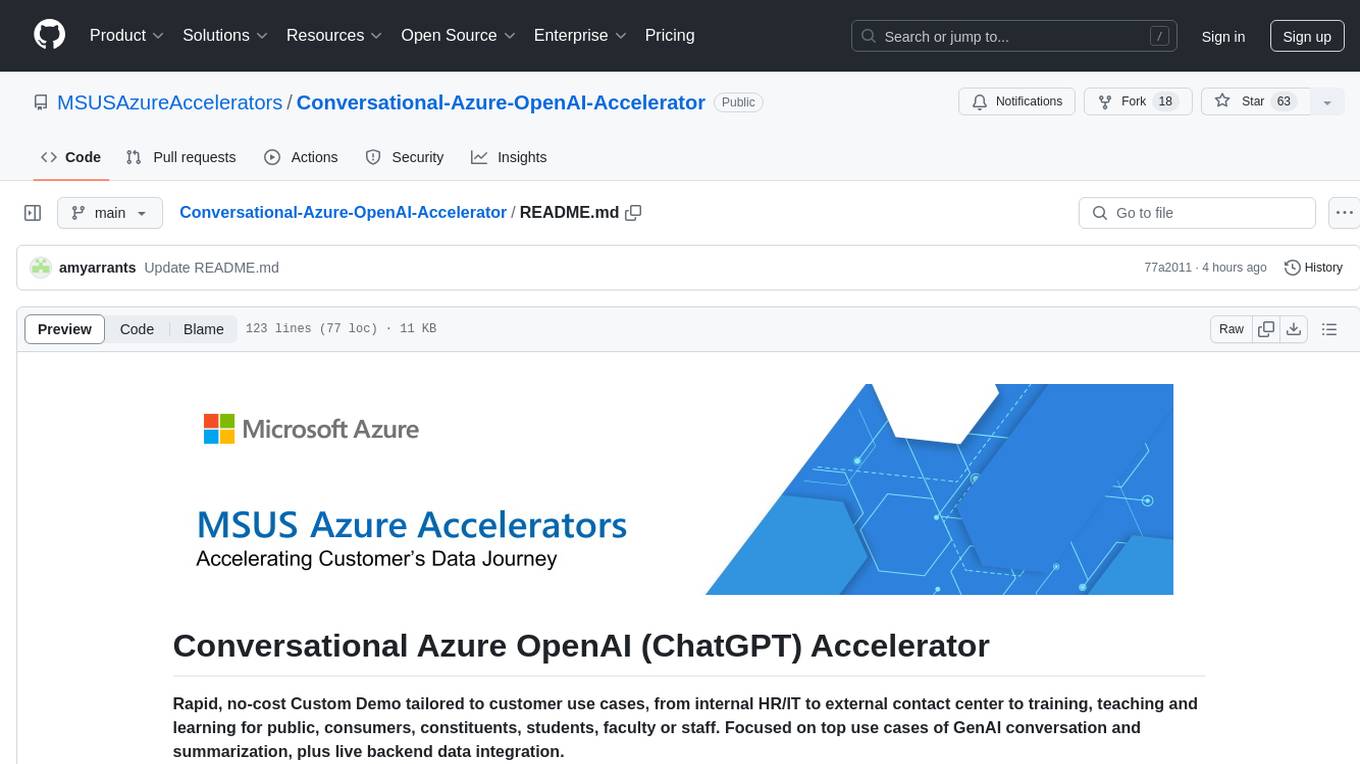
Conversational-Azure-OpenAI-Accelerator
The Conversational Azure OpenAI Accelerator is a tool designed to provide rapid, no-cost custom demos tailored to customer use cases, from internal HR/IT to external contact centers. It focuses on top use cases of GenAI conversation and summarization, plus live backend data integration. The tool automates conversations across voice and text channels, providing a valuable way to save money and improve customer and employee experience. By combining Azure OpenAI + Cognitive Search, users can efficiently deploy a ChatGPT experience using web pages, knowledge base articles, and data sources. The tool enables simultaneous deployment of conversational content to chatbots, IVR, voice assistants, and more in one click, eliminating the need for in-depth IT involvement. It leverages Microsoft's advanced AI technologies, resulting in a conversational experience that can converse in human-like dialogue, respond intelligently, and capture content for omni-channel unified analytics.
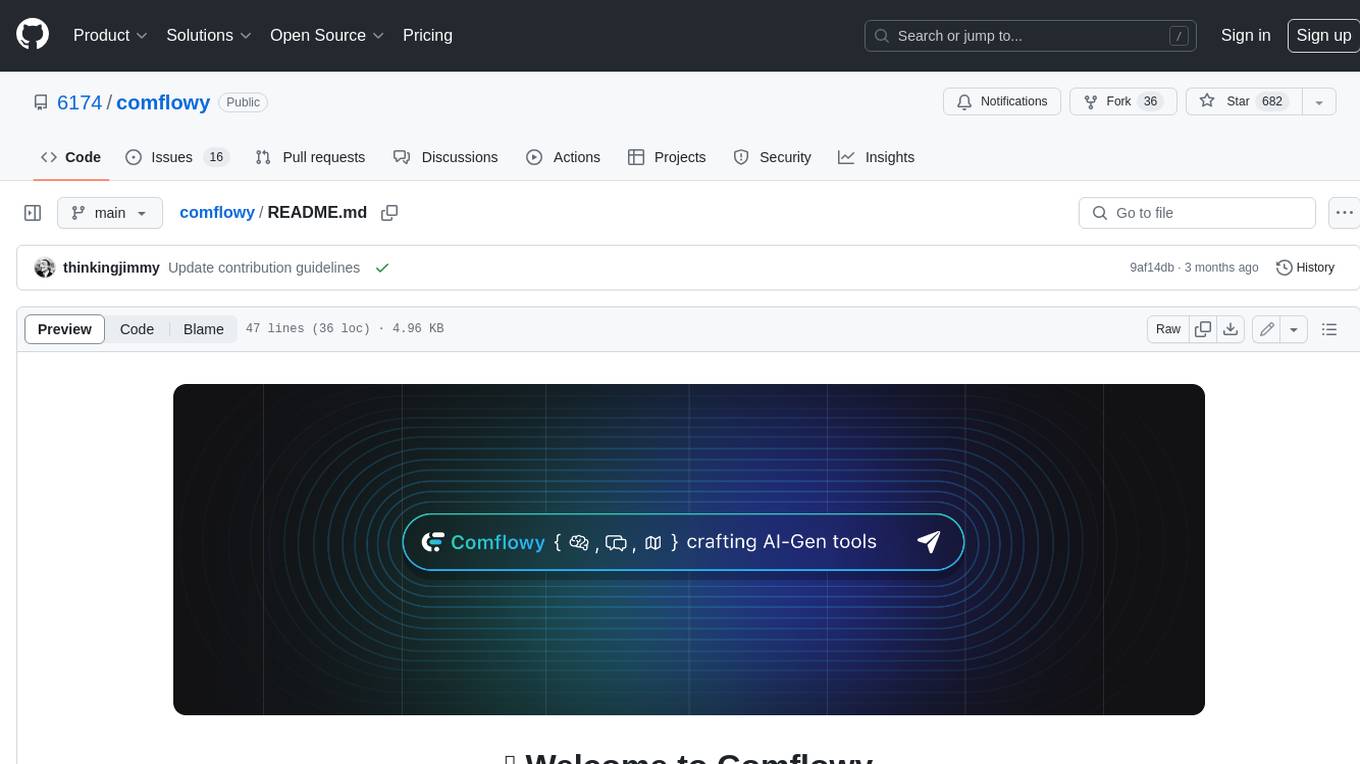
comflowy
Comflowy is a community dedicated to providing comprehensive tutorials, fostering discussions, and building a database of workflows and models for ComfyUI and Stable Diffusion. Our mission is to lower the entry barrier for ComfyUI users, promote its mainstream adoption, and contribute to the growth of the AI generative graphics community.
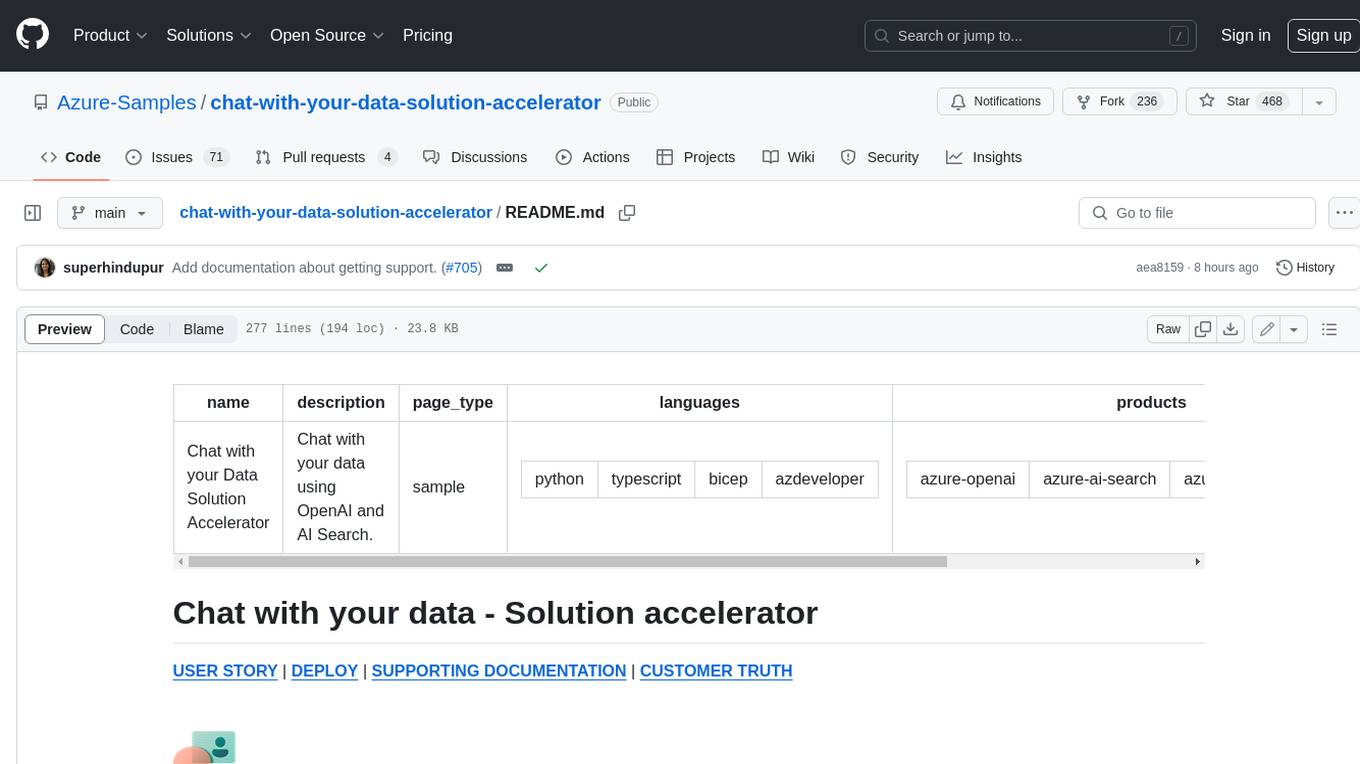
chat-with-your-data-solution-accelerator
Chat with your data using OpenAI and AI Search. This solution accelerator uses an Azure OpenAI GPT model and an Azure AI Search index generated from your data, which is integrated into a web application to provide a natural language interface, including speech-to-text functionality, for search queries. Users can drag and drop files, point to storage, and take care of technical setup to transform documents. There is a web app that users can create in their own subscription with security and authentication.
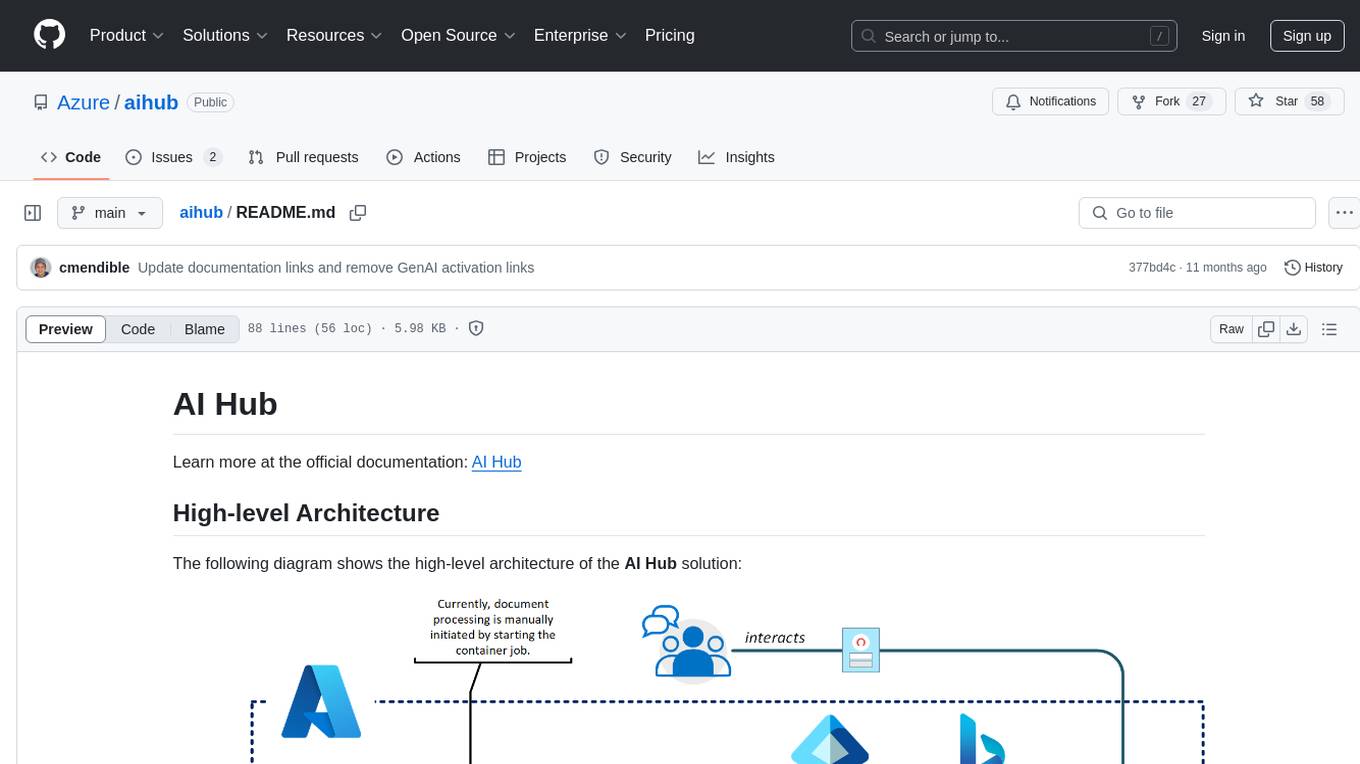
aihub
AI Hub is a comprehensive solution that leverages artificial intelligence and cloud computing to provide functionalities such as document search and retrieval, call center analytics, image analysis, brand reputation analysis, form analysis, document comparison, and content safety moderation. It integrates various Azure services like Cognitive Search, ChatGPT, Azure Vision Services, and Azure Document Intelligence to offer scalable, extensible, and secure AI-powered capabilities for different use cases and scenarios.
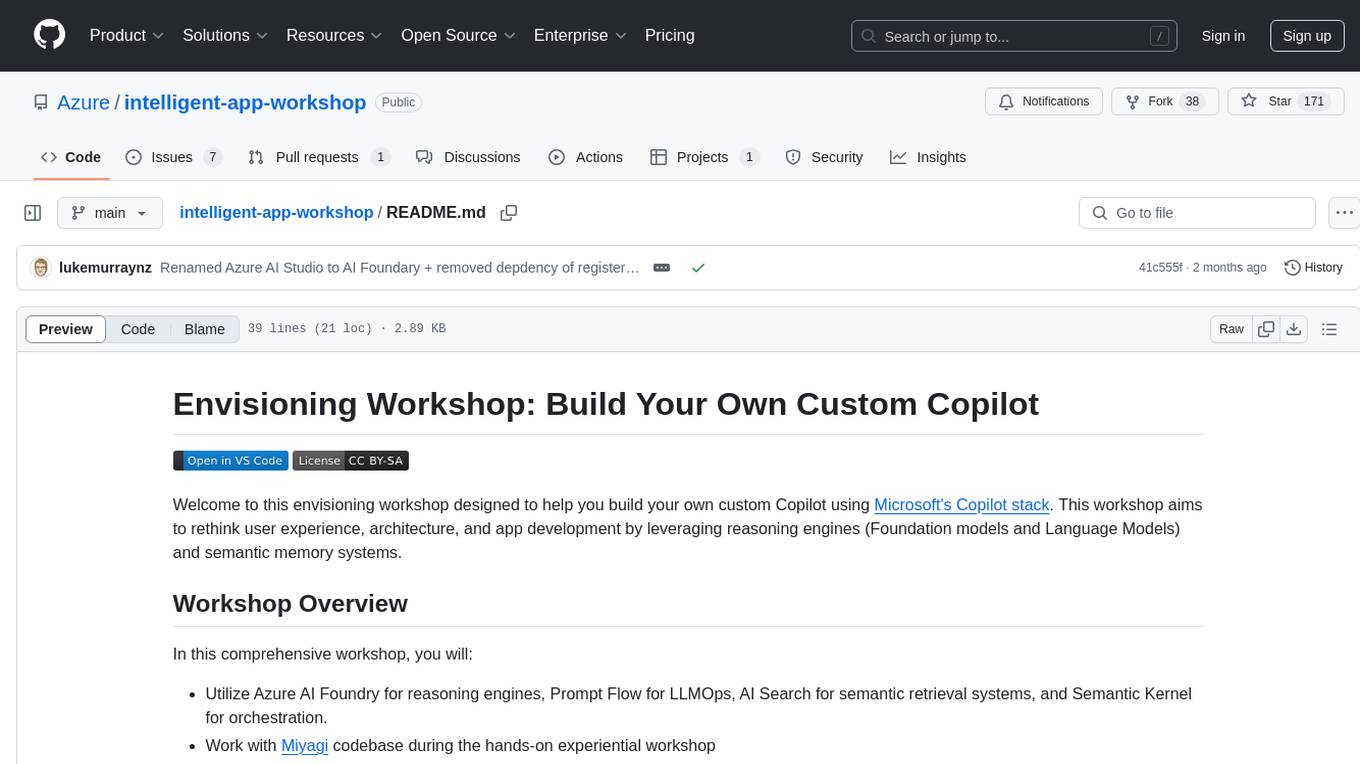
intelligent-app-workshop
Welcome to the envisioning workshop designed to help you build your own custom Copilot using Microsoft's Copilot stack. This workshop aims to rethink user experience, architecture, and app development by leveraging reasoning engines and semantic memory systems. You will utilize Azure AI Foundry, Prompt Flow, AI Search, and Semantic Kernel. Work with Miyagi codebase, explore advanced capabilities like AutoGen and GraphRag. This workshop guides you through the entire lifecycle of app development, including identifying user needs, developing a production-grade app, and deploying on Azure with advanced capabilities. By the end, you will have a deeper understanding of leveraging Microsoft's tools to create intelligent applications.

xef
xef.ai is a one-stop library designed to bring the power of modern AI to applications and services. It offers integration with Large Language Models (LLM), image generation, and other AI services. The library is packaged in two layers: core libraries for basic AI services integration and integrations with other libraries. xef.ai aims to simplify the transition to modern AI for developers by providing an idiomatic interface, currently supporting Kotlin. Inspired by LangChain and Hugging Face, xef.ai may transmit source code and user input data to third-party services, so users should review privacy policies and take precautions. Libraries are available in Maven Central under the `com.xebia` group, with `xef-core` as the core library. Developers can add these libraries to their projects and explore examples to understand usage.
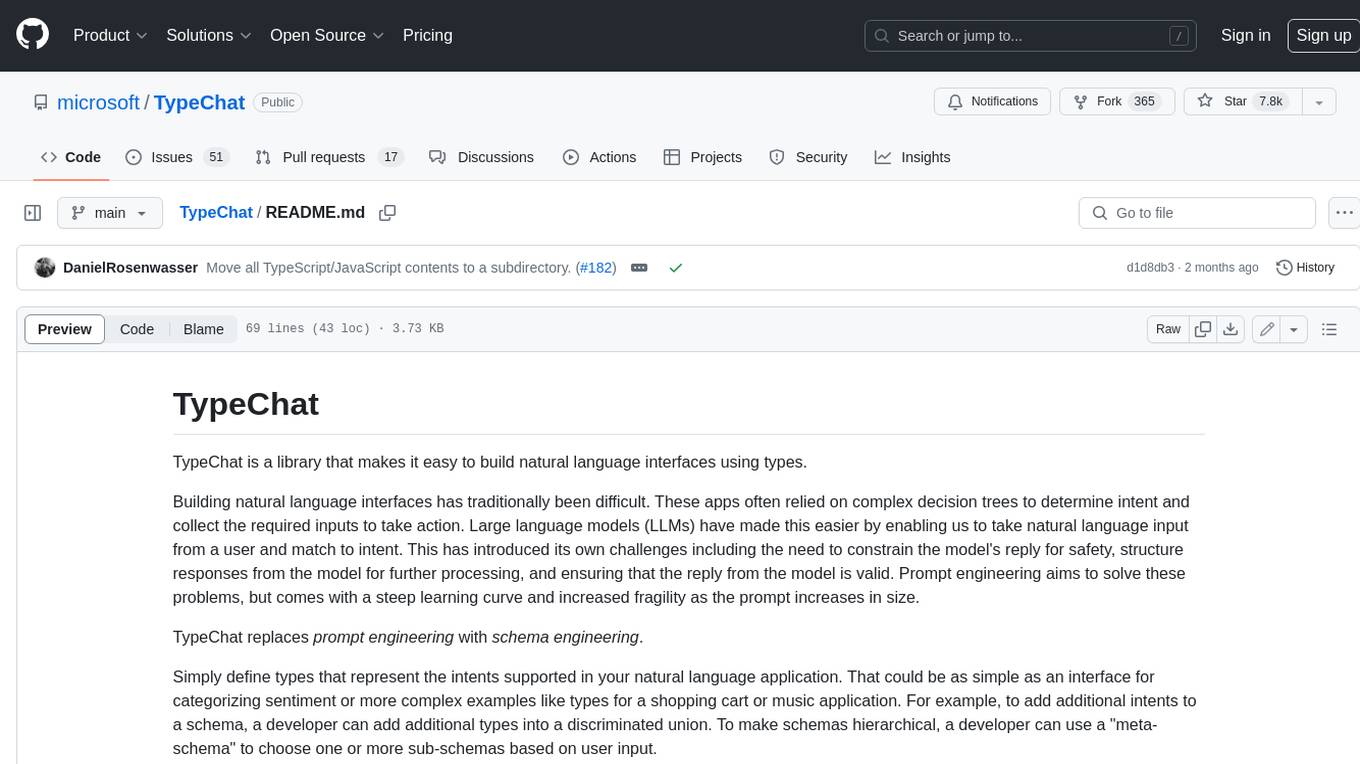
TypeChat
TypeChat is a library that simplifies the creation of natural language interfaces using types. Traditionally, building natural language interfaces has been challenging, often relying on complex decision trees to determine intent and gather necessary inputs for action. Large language models (LLMs) have simplified this process by allowing us to accept natural language input from users and match it to intent. However, this has introduced new challenges, such as the need to constrain the model's response for safety, structure responses from the model for further processing, and ensure the validity of the model's response. Prompt engineering aims to address these issues, but it comes with a steep learning curve and increased fragility as the prompt grows in size.

Azure-Analytics-and-AI-Engagement
The Azure-Analytics-and-AI-Engagement repository provides packaged Industry Scenario DREAM Demos with ARM templates (Containing a demo web application, Power BI reports, Synapse resources, AML Notebooks etc.) that can be deployed in a customer’s subscription using the CAPE tool within a matter of few hours. Partners can also deploy DREAM Demos in their own subscriptions using DPoC.
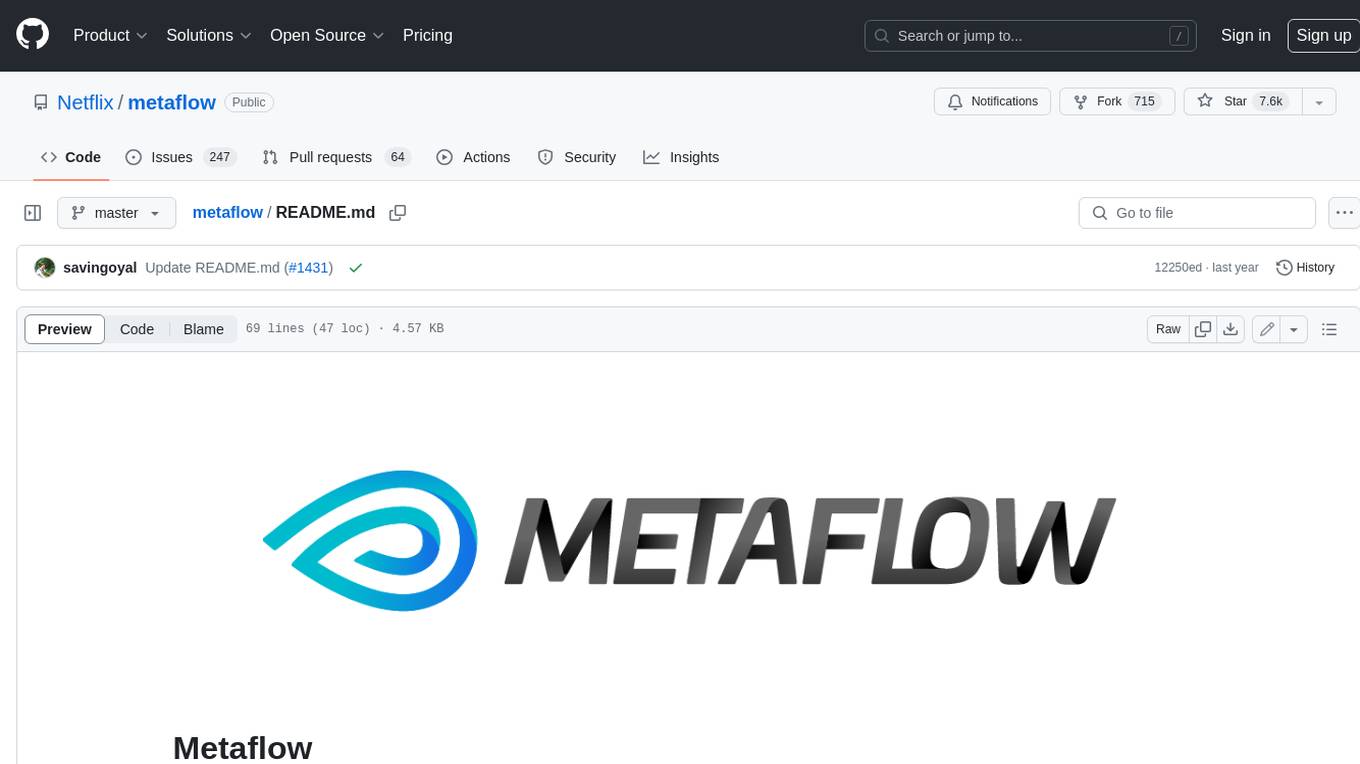
metaflow
Metaflow is a user-friendly library designed to assist scientists and engineers in developing and managing real-world data science projects. Initially created at Netflix, Metaflow aimed to enhance the productivity of data scientists working on diverse projects ranging from traditional statistics to cutting-edge deep learning. For further information, refer to Metaflow's website and documentation.
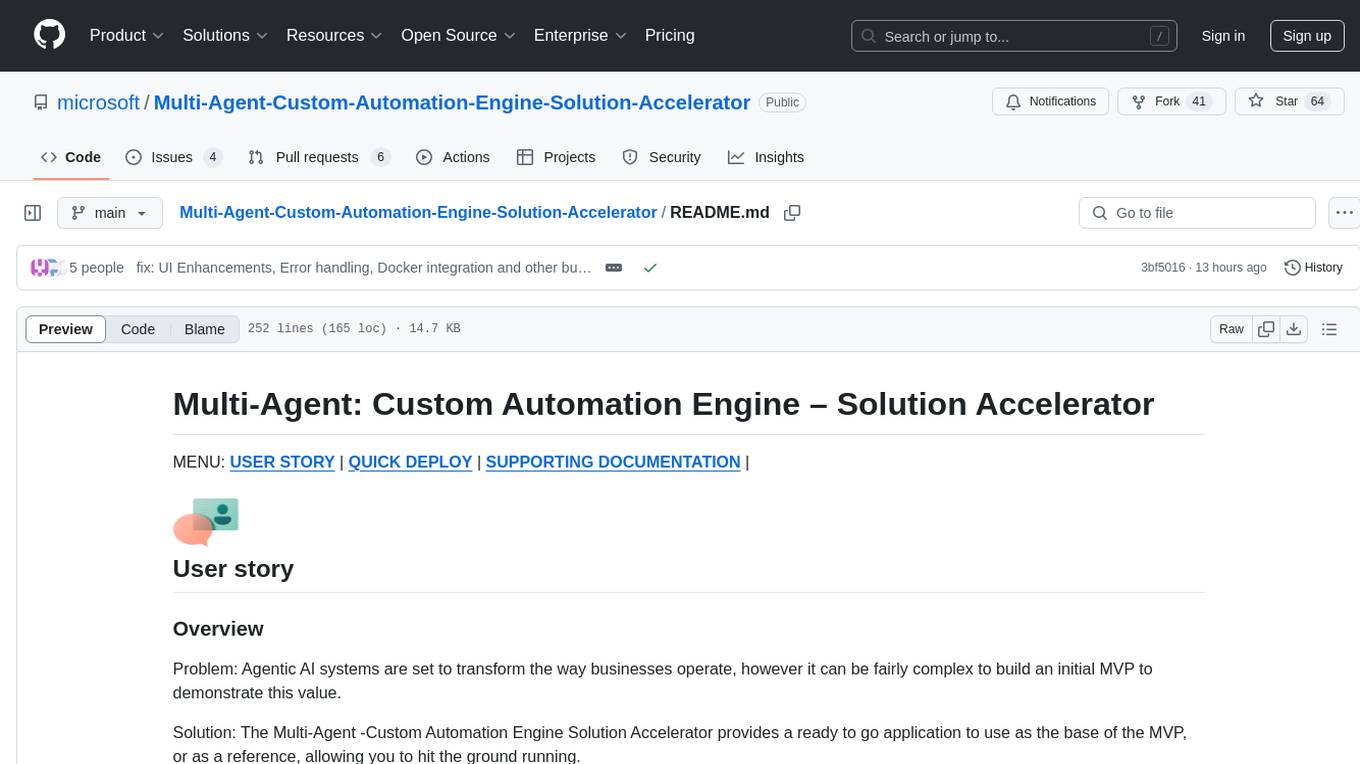
Multi-Agent-Custom-Automation-Engine-Solution-Accelerator
The Multi-Agent -Custom Automation Engine Solution Accelerator is an AI-driven orchestration system that manages a group of AI agents to accomplish tasks based on user input. It uses a FastAPI backend to handle HTTP requests, processes them through various specialized agents, and stores stateful information using Azure Cosmos DB. The system allows users to focus on what matters by coordinating activities across an organization, enabling GenAI to scale, and is applicable to most industries. It is intended for developing and deploying custom AI solutions for specific customers, providing a foundation to accelerate building out multi-agent systems.
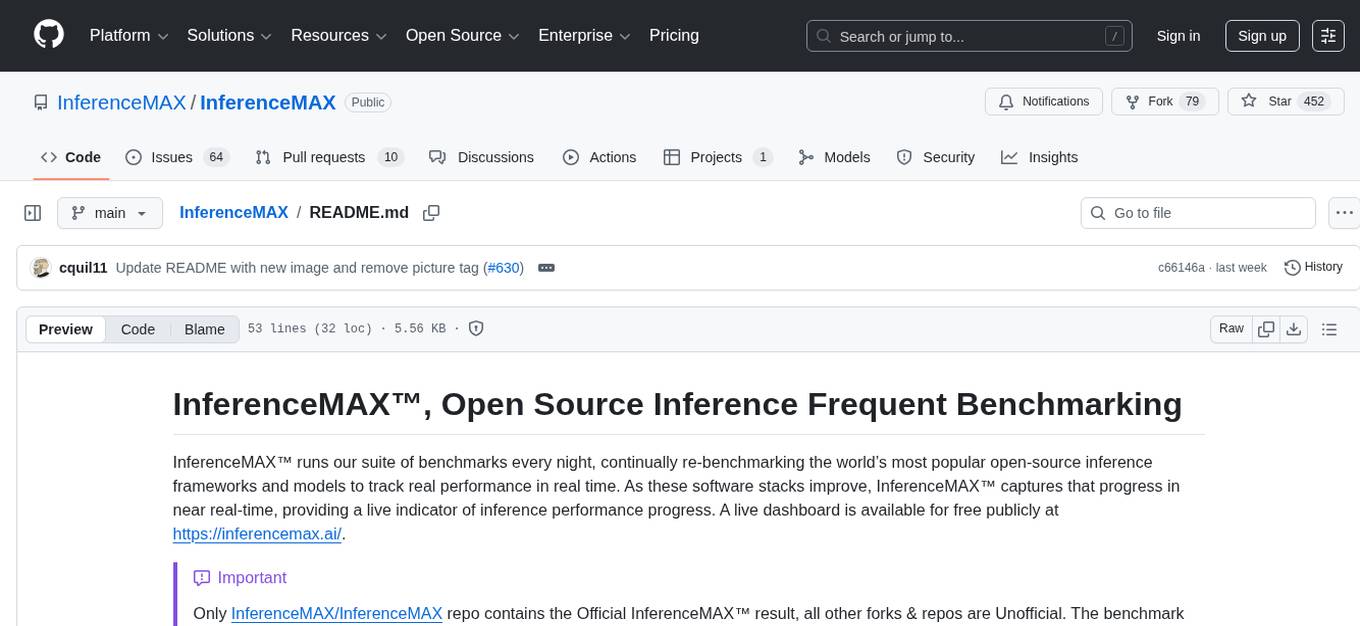
InferenceMAX
InferenceMAX™ is an open-source benchmarking tool designed to track real-time performance improvements in popular open-source inference frameworks and models. It runs a suite of benchmarks every night to capture progress in near real-time, providing a live indicator of inference performance. The tool addresses the challenge of rapidly evolving software ecosystems by benchmarking the latest software packages, ensuring that benchmarks do not go stale. InferenceMAX™ is supported by industry leaders and contributors, providing transparent and reproducible benchmarks that help the ML community make informed decisions about hardware and software performance.
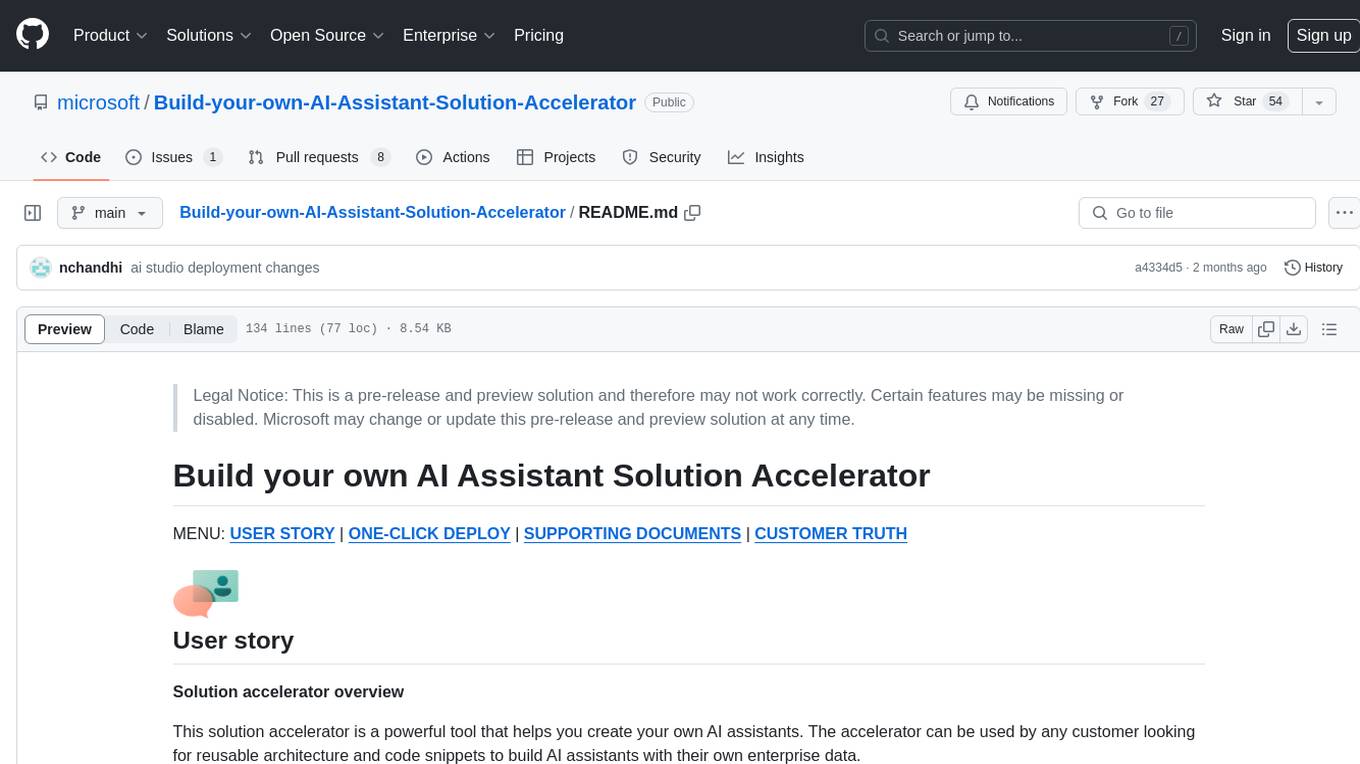
Build-your-own-AI-Assistant-Solution-Accelerator
Build-your-own-AI-Assistant-Solution-Accelerator is a pre-release and preview solution that helps users create their own AI assistants. It leverages Azure Open AI Service, Azure AI Search, and Microsoft Fabric to identify, summarize, and categorize unstructured information. Users can easily find relevant articles and grants, generate grant applications, and export them as PDF or Word documents. The solution accelerator provides reusable architecture and code snippets for building AI assistants with enterprise data. It is designed for researchers looking to explore flu vaccine studies and grants to accelerate grant proposal submissions.
For similar tasks
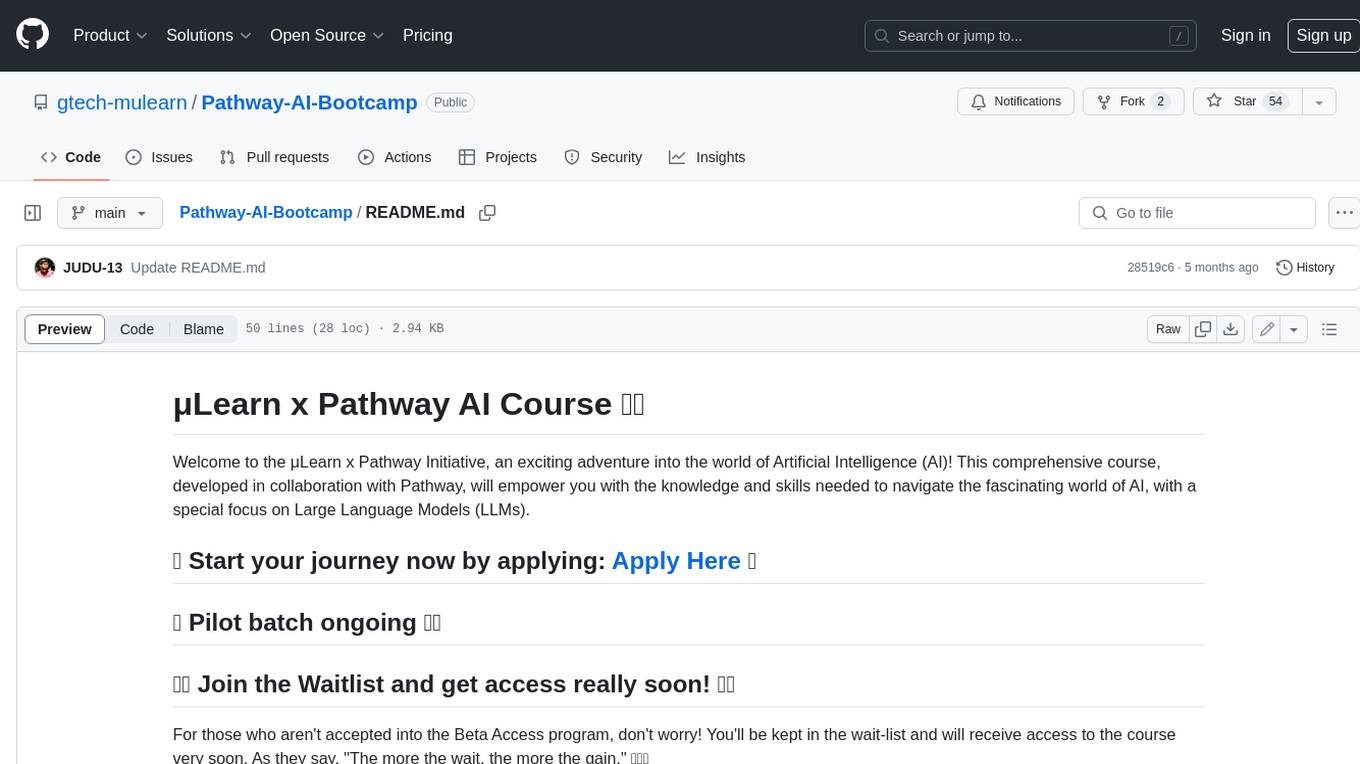
Pathway-AI-Bootcamp
Welcome to the μLearn x Pathway Initiative, an exciting adventure into the world of Artificial Intelligence (AI)! This comprehensive course, developed in collaboration with Pathway, will empower you with the knowledge and skills needed to navigate the fascinating world of AI, with a special focus on Large Language Models (LLMs).
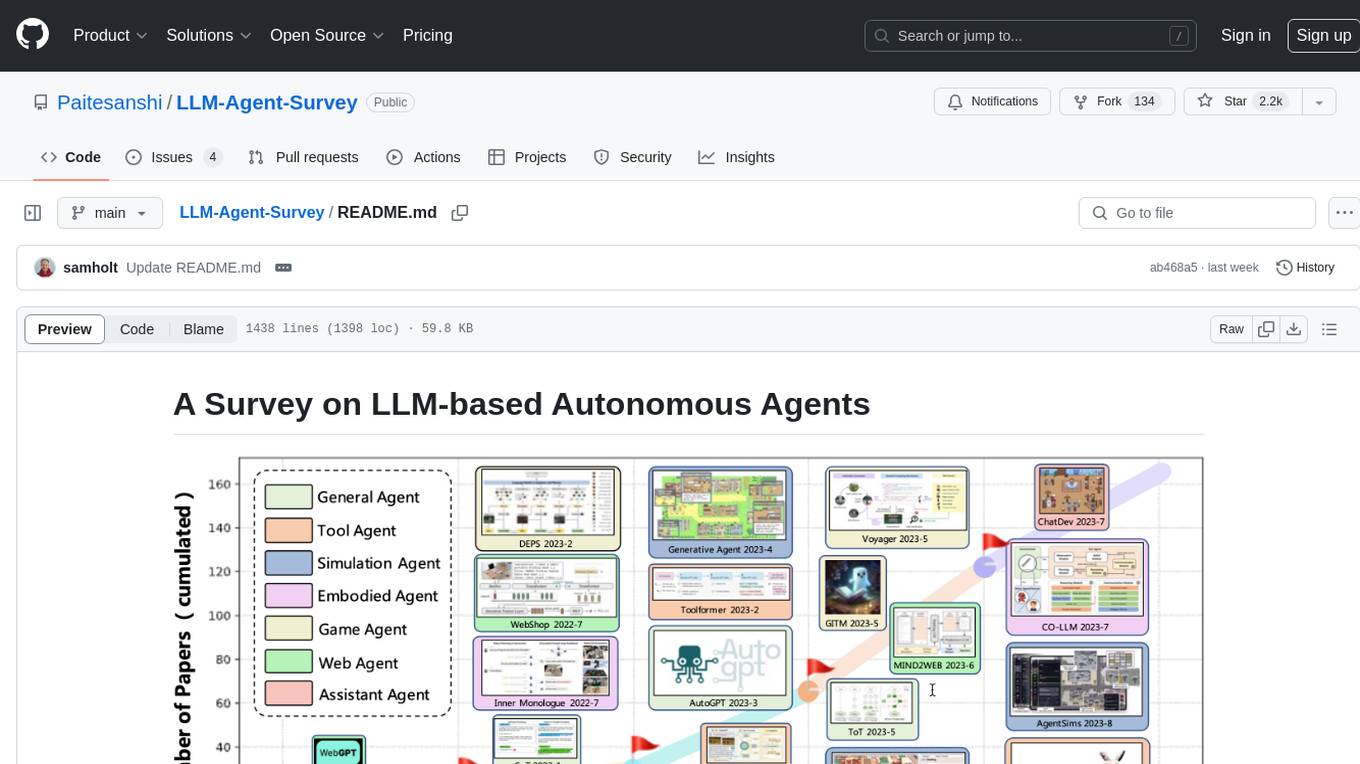
LLM-Agent-Survey
Autonomous agents are designed to achieve specific objectives through self-guided instructions. With the emergence and growth of large language models (LLMs), there is a growing trend in utilizing LLMs as fundamental controllers for these autonomous agents. This repository conducts a comprehensive survey study on the construction, application, and evaluation of LLM-based autonomous agents. It explores essential components of AI agents, application domains in natural sciences, social sciences, and engineering, and evaluation strategies. The survey aims to be a resource for researchers and practitioners in this rapidly evolving field.

genkit
Firebase Genkit (beta) is a framework with powerful tooling to help app developers build, test, deploy, and monitor AI-powered features with confidence. Genkit is cloud optimized and code-centric, integrating with many services that have free tiers to get started. It provides unified API for generation, context-aware AI features, evaluation of AI workflow, extensibility with plugins, easy deployment to Firebase or Google Cloud, observability and monitoring with OpenTelemetry, and a developer UI for prototyping and testing AI features locally. Genkit works seamlessly with Firebase or Google Cloud projects through official plugins and templates.
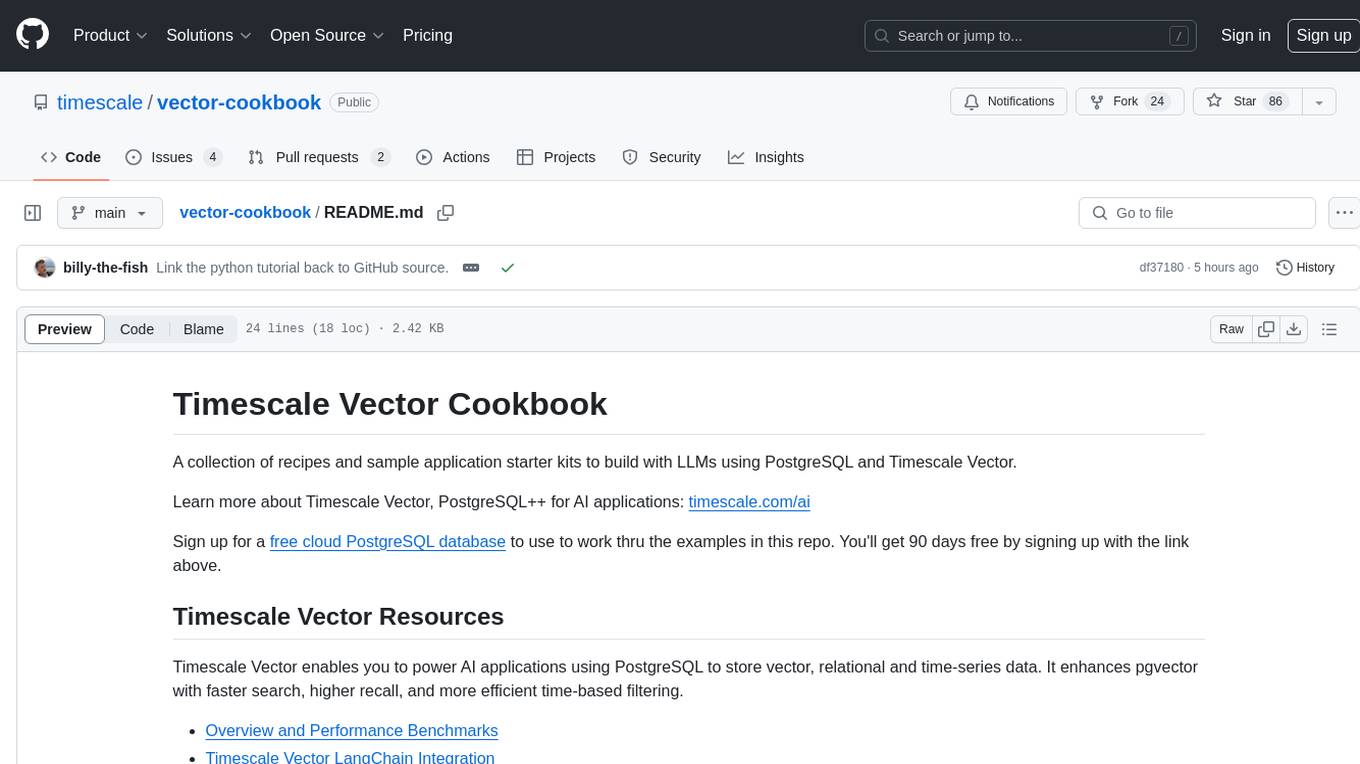
vector-cookbook
The Vector Cookbook is a collection of recipes and sample application starter kits for building AI applications with LLMs using PostgreSQL and Timescale Vector. Timescale Vector enhances PostgreSQL for AI applications by enabling the storage of vector, relational, and time-series data with faster search, higher recall, and more efficient time-based filtering. The repository includes resources, sample applications like TSV Time Machine, and guides for creating, storing, and querying OpenAI embeddings with PostgreSQL and pgvector. Users can learn about Timescale Vector, explore performance benchmarks, and access Python client libraries and tutorials.
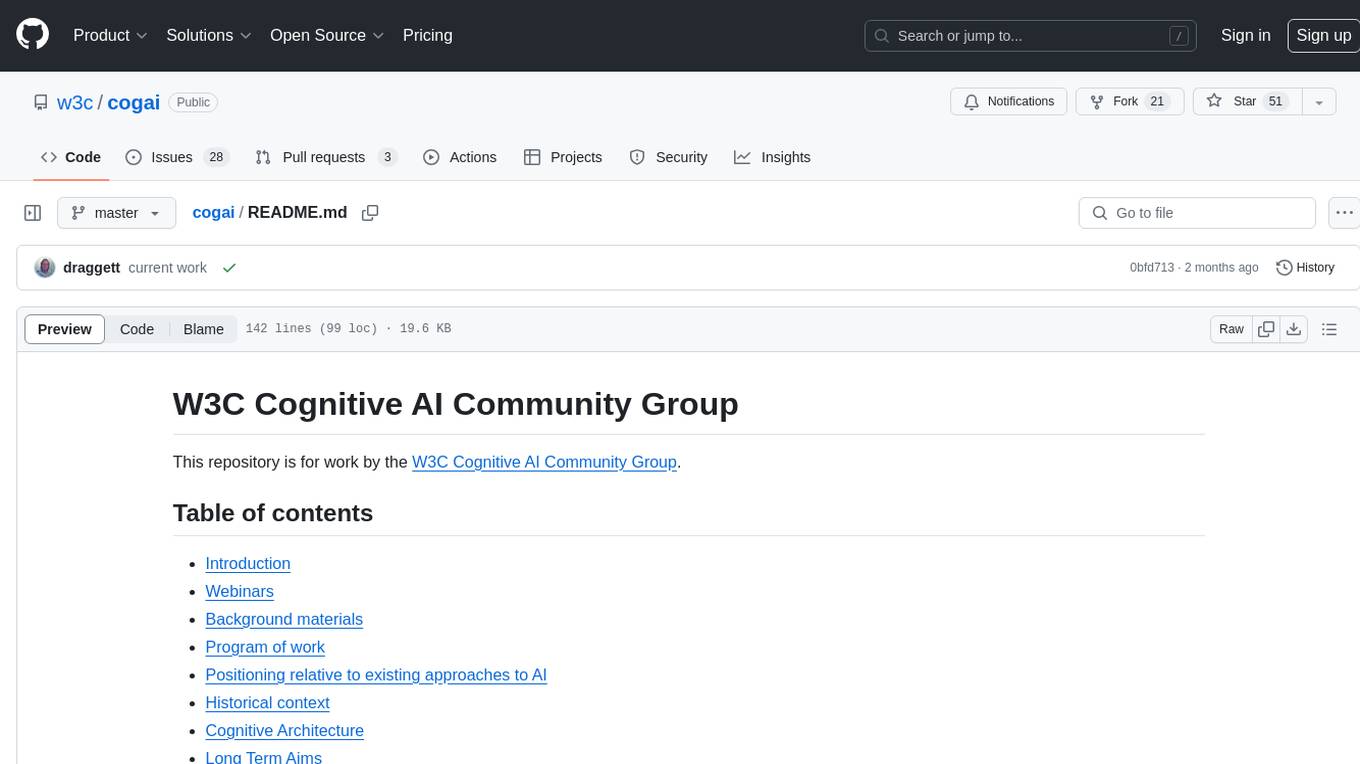
cogai
The W3C Cognitive AI Community Group focuses on advancing Cognitive AI through collaboration on defining use cases, open source implementations, and application areas. The group aims to demonstrate the potential of Cognitive AI in various domains such as customer services, healthcare, cybersecurity, online learning, autonomous vehicles, manufacturing, and web search. They work on formal specifications for chunk data and rules, plausible knowledge notation, and neural networks for human-like AI. The group positions Cognitive AI as a combination of symbolic and statistical approaches inspired by human thought processes. They address research challenges including mimicry, emotional intelligence, natural language processing, and common sense reasoning. The long-term goal is to develop cognitive agents that are knowledgeable, creative, collaborative, empathic, and multilingual, capable of continual learning and self-awareness.

ai-hub
The Enterprise Azure OpenAI Hub is a comprehensive repository designed to guide users through the world of Generative AI on the Azure platform. It offers a structured learning experience to accelerate the transition from concept to production in an Enterprise context. The hub empowers users to explore various use cases with Azure services, ensuring security and compliance. It provides real-world examples and playbooks for practical insights into solving complex problems and developing cutting-edge AI solutions. The repository also serves as a library of proven patterns, aligning with industry standards and promoting best practices for secure and compliant AI development.
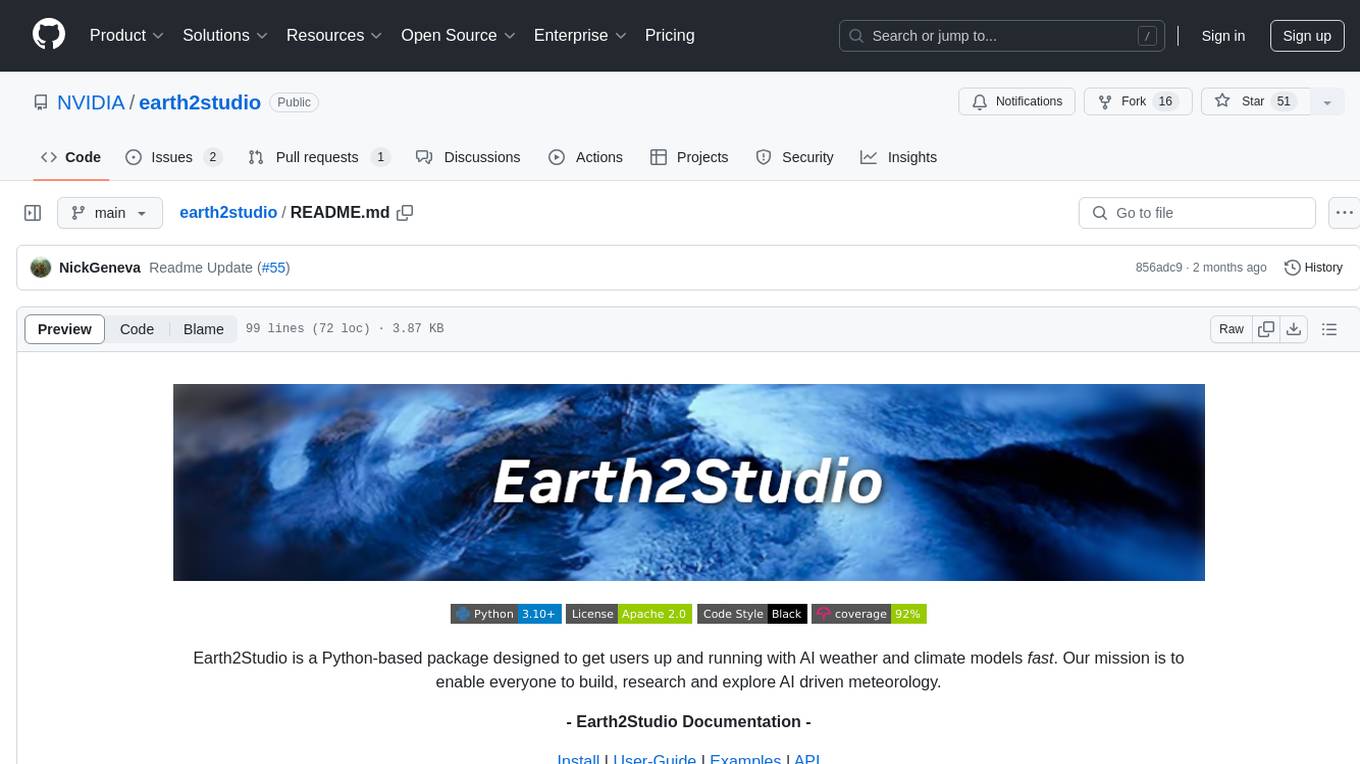
earth2studio
Earth2Studio is a Python-based package designed to enable users to quickly get started with AI weather and climate models. It provides access to pre-trained models, diagnostic tools, data sources, IO utilities, perturbation methods, and sample workflows for building custom weather prediction workflows. The package aims to empower users to explore AI-driven meteorology through modular components and seamless integration with other Nvidia packages like Modulus.
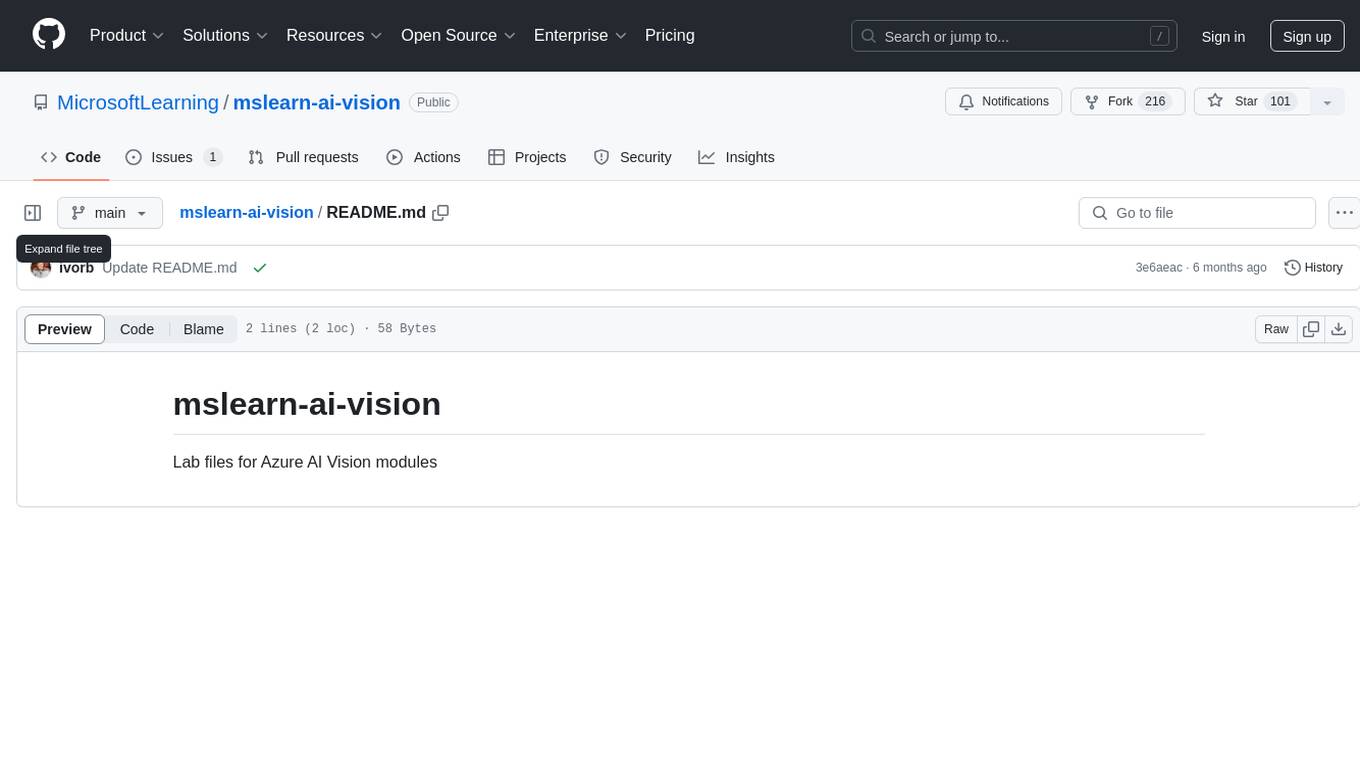
mslearn-ai-vision
The 'mslearn-ai-vision' repository contains lab files for Azure AI Vision modules. It provides hands-on exercises and resources for learning about AI vision capabilities on the Azure platform. The labs cover topics such as image recognition, object detection, and image classification using Azure's AI services. By following the lab exercises, users can gain practical experience in building and deploying AI vision solutions in the cloud.
For similar jobs

sweep
Sweep is an AI junior developer that turns bugs and feature requests into code changes. It automatically handles developer experience improvements like adding type hints and improving test coverage.

teams-ai
The Teams AI Library is a software development kit (SDK) that helps developers create bots that can interact with Teams and Microsoft 365 applications. It is built on top of the Bot Framework SDK and simplifies the process of developing bots that interact with Teams' artificial intelligence capabilities. The SDK is available for JavaScript/TypeScript, .NET, and Python.

ai-guide
This guide is dedicated to Large Language Models (LLMs) that you can run on your home computer. It assumes your PC is a lower-end, non-gaming setup.

classifai
Supercharge WordPress Content Workflows and Engagement with Artificial Intelligence. Tap into leading cloud-based services like OpenAI, Microsoft Azure AI, Google Gemini and IBM Watson to augment your WordPress-powered websites. Publish content faster while improving SEO performance and increasing audience engagement. ClassifAI integrates Artificial Intelligence and Machine Learning technologies to lighten your workload and eliminate tedious tasks, giving you more time to create original content that matters.

chatbot-ui
Chatbot UI is an open-source AI chat app that allows users to create and deploy their own AI chatbots. It is easy to use and can be customized to fit any need. Chatbot UI is perfect for businesses, developers, and anyone who wants to create a chatbot.

BricksLLM
BricksLLM is a cloud native AI gateway written in Go. Currently, it provides native support for OpenAI, Anthropic, Azure OpenAI and vLLM. BricksLLM aims to provide enterprise level infrastructure that can power any LLM production use cases. Here are some use cases for BricksLLM: * Set LLM usage limits for users on different pricing tiers * Track LLM usage on a per user and per organization basis * Block or redact requests containing PIIs * Improve LLM reliability with failovers, retries and caching * Distribute API keys with rate limits and cost limits for internal development/production use cases * Distribute API keys with rate limits and cost limits for students

uAgents
uAgents is a Python library developed by Fetch.ai that allows for the creation of autonomous AI agents. These agents can perform various tasks on a schedule or take action on various events. uAgents are easy to create and manage, and they are connected to a fast-growing network of other uAgents. They are also secure, with cryptographically secured messages and wallets.

griptape
Griptape is a modular Python framework for building AI-powered applications that securely connect to your enterprise data and APIs. It offers developers the ability to maintain control and flexibility at every step. Griptape's core components include Structures (Agents, Pipelines, and Workflows), Tasks, Tools, Memory (Conversation Memory, Task Memory, and Meta Memory), Drivers (Prompt and Embedding Drivers, Vector Store Drivers, Image Generation Drivers, Image Query Drivers, SQL Drivers, Web Scraper Drivers, and Conversation Memory Drivers), Engines (Query Engines, Extraction Engines, Summary Engines, Image Generation Engines, and Image Query Engines), and additional components (Rulesets, Loaders, Artifacts, Chunkers, and Tokenizers). Griptape enables developers to create AI-powered applications with ease and efficiency.


